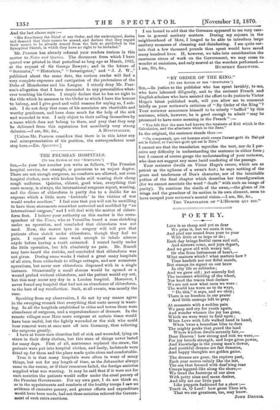THE PRUSSIAN HOSPITALS.
[TO THE EDITOR OF THE "SPECTATOR."]
SIR,—In your last number you write as follows, "The Prussian hospital service, for example, is penurious to an unjust degree. There are not enough surgeons, no comforts are allowed, not even hospital clothes, men with broken limbs still wearing their cheap rough uniforms. Quinine, chloral, good wine, everything that costs money, is always, the international surgeons report, wanting, and the disuse of chloroform is partly due to a dislike for an expense which a little more 'fortitude' in the victims of war would render needless." I feel sure that you will not be unwilling to have these statements somewhat corrected and modified by "an international surgeon," and I will deal with the matter of chloro- form first. I believe your authority on this matter is the corre- spondent of the Times, who at Versailles beard a man shrieking under an operation, and concluded that chloroform was not used. Now, the merest tyro in surgery will tell you that patients often shriek under chloroform, though they feel no pain. I myself was once weak enough to inhale nitrous oxyde before having a tooth extracted. I roared lustily under the little operation, but felt absolutely no pain. Mr. Russell may have heard the shrieks, and concluded that chloroform was not given. During some weeks I visited a great many hospitals of all sizes, from cathedrals to village cottages, and saw numerous operations, but never saw chloroform dispensed with in a single instance. Occasionally a small abscess would be opened or a wound probed without chloroform, and the patient would cry out, but this may occur any day in a London hospital. Moreover, I never found any hospital that had not an abundance of chloroform, to the best of my recollection. Such, at all events, was usually the case.
Speaking from my observation, I do not by any means agree in the sweeping remark that everything that coats money is want- ing. In all the hospitals established in cities and towns there were abundance of surgeons, and a superabundance of dressers. In the remote villages near Metz more surgeons at certain times would have been useful, but the lightly wounded or the sick who could bear removal were at once sent off into Germany, thus relieving the surgeons greatly.
I have at times seen churches full of sick and wounded, lying on straw in their dirty clothes, but this state of things never lasted for many days. First of all, mattresses replaced the straw, the patients were put into hospital clothes, and lastly, bedsteads were fitted up for them and the place made quite clean and comfortable.
True it is that many hospitals were often in want of many things, but not for any length of time, as the Johanniter always came to the rescue, or if their resources failed, the foreign societies supplied what was wanting. It may be said that if it were not for such societies the patients would suffer under the cruel penury of the Prussian Government. For my own part, I do not think so, as the appointments and comforts of the healthy troops I saw no evidence of excessive penury, and greater efforts and expenditure would have been made, had not these societies relieved the Govern- ment of such extra exertions. I am bound to add that the Germans appeared to me very care- less in general sanitary matters. During my sojourn in the neighbourhood of Metz, I longed to be able to introduce large sanitary measures of cleansing and disinfecting. I am quite cer- tain that a few thousand pounds thus spent would have saved many hundred lives. If, however, we take into consideration the enormous stress of work on the Government, we may cease to. wonder at omissions, and only marvel at the wonders performed.—


































 Previous page
Previous page